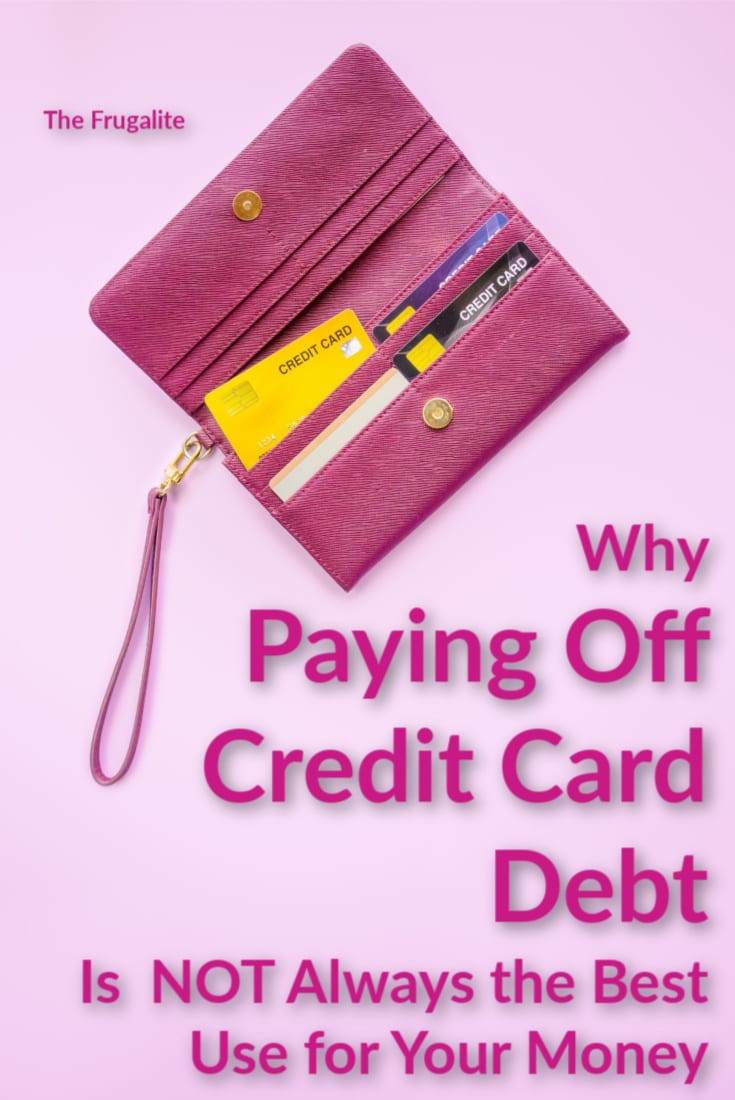(Psst: The FTC wants me to remind you that this website contains affiliate links. That means if you make a purchase from a link you click on, I might receive a small commission. This does not increase the price you’ll pay for that item nor does it decrease the awesomeness of the item. ~ Daisy)
Many Americans owe so much money that they have no idea how they’ll ever manage to pay it off. As we’ve posted before, we’re living in a time that is seeing more than half of the families in the US struggling to pay rent, buy food, and get basic necessities. And heaven help them if they get sick. And that statistic was before Covid and the lockdowns took away millions of jobs and closed tens of thousands of businesses, destroying the personal finances of formerly financially comfortable Americans.
And on top of all that, many are drowning in credit card debt.
This article isn’t for people who have their financial poo together and have well-managed or no debt. This is for folks who have gotten in over their heads. This isn’t about secured debt like homes and cars. We’re talking about credit card debt and similar payments.
Many Americans live on credit
As I mentioned above, lots of folks are struggling to get by. But for many, the struggle doesn’t slow them down. They live a life fueled by debt and funded by credit cards. It’s incredibly easy for most people to get store credit cards with exorbitant interest rates. I’ve known a person who couldn’t afford groceries who went to TJ Maxx and used her store card to buy the snack foods they had there (along with some nice throw pillows.)
Every year, Christmas just makes it worse. Even before the bills came rolling in, a survey from AJC speculated that average spending in 2018 would be $1007.24 per person. It ended up that folks in the US spent over a trillion dollars in 2018. (And because many Americans have little cash to spare, it’s a safe bet that these Christmas gifts were directly added to credit card debt.)
Debt that is already astronomical, by the way. Household debt is over $12 trillion and climbing. And to make matters even worse, 71 million of these indebted Americans owe money that is past due by 180 days or more. Obviously, their days of credit card spending are over because there’s no way they’ll be extended more credit. And even folks who are still making minimum payments are finding themselves no more available credit – over half of all Americans have every single card maxed out.
One of the best ways to lower your monthly expenses is to get yourself out of debt. This is the standard advice.
But is paying off debt always the best option?
I’m going to give some unpopular advice here. Paying off debt is not always the best option. It differs from case to case.
Let me preface this with the fact that I believe if you promise to pay a debt, paying it should absolutely be a priority. I’m not recommending that people go out and spend frivolously with no intention of paying it back. That’s stealing and a horrible thing to do.
But I recognize that situations can change, and they can do so very suddenly. And if that is your situation, paying off your credit card bill may not be the best thing to do with your money.
If you only owe a couple thousand dollars, by all means, getting rid of that debt is very important if you can still afford the essentials of life.
But if you can’t afford food for your family or rent for your apartment or electricity or gas for the car to get to work, those credit card companies are going to have to wait. Again, I recommend you be responsible for debts you owe, but you may have to put off paying them back until you have your feet back on the ground.
If you do that, your credit will be ruined, but your life is not over when your credit is ruined. Sure, things will be harder, interest rates will be higher, but you’ll still be able to survive with a low credit rating.
If you’re deeply in debt, here’s my advice.
If you’ve been living off your credit cards, shopping like you’re wealthy, going to fine dinners, and now you can’t even make your minimum payments, you’re going to have to make some changes, FAST.
First, you need to make a budget for your barebones expenses. These are the things you must pay – the essentials like rent, groceries (not restaurant meals), utilities, car insurance – those kinds of things.
Split your essentials up over your paychecks. For me, one paycheck goes almost entirely to rent and whatever is left over is groceries. My other check covers the bills like electric, gas, and internet. And then I drop $50 per pay period on preps and put at least $100 in savings. And regardless of your debt level, I suggest you do the same.
Daisy, are you insane?
What? Don’t pay a bill and put money in savings?
Yes, absolutely. An emergency fund is another essential. This will help you out with an unexpected medical bill, when your daughter breaks her glasses and needs new ones ASAP, if the refrigerator stops working, or if your car breaks down. Without an emergency fund, you are one paycheck away from an epic disaster like actual homelessness.
Then spend some money on your pantry. Get foods that can be shelf-stable for a long time, like canned goods, dried beans, rice, tuna, flour, peanut butter, etc. Here, I have a tasty 4-week menu using shelf-stable foods along with a shopping list that might be a good way to get started.
Then, with whatever you have left, divvy it up among your credit cards. It may not be your minimum payments. It is what it is. You will do your best to reduce your budget and pay things off, but don’t do it at the expense of forsaking an emergency fund and building a pantry. (Here’s my book about building a pantry using your regular grocery budget.)
If you’ve gotten yourself so deeply into debt that you’re struggling to pay rent, you’re going to have to reprioritize to survive.
Now, what about those credit cards?
Okay, next, you have to start dealing with your credit cards. This is going to be a stark period without a lot of fun extras like celebratory dinners out or new clothes with each fashion season. Trust me, you’ll live.
After the expenditures above – your basics, your emergency fund, and your pantry contributions – look at how much you have left.
Then you need to write down the following for each credit card/debt:
- Total balance
- Minimum payment
- Interest rate
With the money you have left from your budget, can you make the minimum payments? If you cannot, you have a problem.
To make this easier, let’s say you have 5 credit cards each makes out to $2000. Let’s say your minimum payment on each is $200 – that’s $1000 a month in minimum payments. Yikes!
Here are your options.
- If your credit is still good enough to roll this all into one loan with one single, reasonable payment, do that. This will maintain your credit and allow you to pay this stuff off with reasonable interest. But for most folks at this point, their credit will not get them the loan they desire.
- There are also debt settlement services. They go in and offer the companies a percentage of what you owe and the companies don’t come after you for the rest. You pay the debt settlement services a fee each month when you make a monthly payment toward the settled debt. This also ruins your credit.
- If you can afford the minimum payments and a teeny bit more, you can attack your debt with Dave Ramsey’s snowball method, explained in this article.
- If you cannot afford the minimum payments, calculate what money you have available for debt repayment. Our imaginary debt here has minimum payments of $1000 a month. Let’s say that you only have $200 a month remaining after housing and feeding yourselves. You can either make one payment and default on the others (not what I recommend) or you can start calling the credit card companies to wheel and deal (what I recommend.) We’ll talk more about this method of getting a handle on your budget.
I very strongly recommend that you get rid of your cards. Stop spending money that you don’t have. It’s one thing to be in over your head but quite another to continue to do the same things that got you into this trouble in the first place.
Negotiating with credit card companies
Credit card companies will almost always negotiate. They would rather get some money than no money and will generally be willing to negotiate. For the purpose of this article, we’ll assume you don’t have a lump sum of 50% of your debt to give them and have them call it good. If you had 5 grand lying around, you wouldn’t be in this situation, right?
It’s important to note that when you begin negotiating with companies, your credit line will nearly always be frozen and you won’t be able to use your cards again. This will seem like it sucks, but it’s really for the best.
If your personal financial situation is temporary, most companies will do something called “forbearance.”
It is a short term suspension of any payments you need to make. Forbearance provides you with a break from having to make your entire monthly credit card payments for what usually amounts to several weeks up to maybe several months. It is when a credit card issuer provides you with a temporary reprieve on your monthly payments that will usually last for a couple months, but the length will vary. It isn’t forgiveness of your obligations, but it is a temporary reprieve from your debts. There are different types of forbearance programs.
One is a postponement of your debt for six months, a year, or, very rarely, even longer. During this timeframe your interest will continue to accrue on your account, however you may get a reduced interest rate so that while your interest will accrue, it will be not be at as high of an interest rate as you currently have.
There are additional programs though. Another type of forbearance will offer consumers a lower monthly minimum payment, elimination of late fees and charges, and/or a reduced interest rate. (source)
The other option is working out a payment plan. This will take some serious negotiation on your part. You may have to call the company (or companies) multiple times to get that magic person who will help you out. You want to speak to a credit manager. According to CreditCards.com:
Customer service representatives who answer the phone likely will not have the authority to grant what you need, even if they won’t admit it. State that you need the department that handles settlement arrangements, or workout arrangements. Every card and bank is set up differently, with different policies, department names and special programs. Some department names to try: in-house help program, workout program or loss mitigation. (source)
When you finally get the person that has the power to negotiate with you, get his or her name and direct phone number or extension, as well as the person’s email address.
Here are your goals:
- You want to freeze or at least dramatically lower interest rates
- You want a lower payment than you’ve been making
- You might be able to get them to remove some previous late fees, charges for going over your limit, or even some previous interest. This doesn’t happen often but it never hurts to ask.
Let them know you really want to pay them. If they aren’t budging, say that you are sincerely trying to avoid bankruptcy. If you were to go bankrupt, they most likely wouldn’t receive a dime.
Get your agreement in writing. Ask the person with whom you’re dealing to send that to you by email while you are still on the phone. And don’t be shy about asking for the recording of your conversation.
If you are unable to get agreements you can manage, you may need professional help. Try contacting a non-profit credit counseling agency associated with either National Foundation for Credit Counseling or the Association of Independent Consumer Credit Counseling Agencies. They can make arrangements on your behalf and they can also tell you when you’ve gotten in so deep the only way to ever see the light of financial day again is to go bankrupt.
Bankruptcy should always be the last option because debts are a promise and keeping your word is important. As well, it will severely affect your life for years to come. However, there really are some situations in which a person gets in over his or her head or their income changes and there is just no way to pay off the debt.
To make a long story short
I’m not condoning breaking your agreements to pay debts. But in these financially volatile times, don’t overlook the importance of building an emergency fund or of increasing your stockpile. Even if you have gotten yourself into financial trouble with debt, these things need to be funded first.
I realize this goes against the popular advice of just about every financial guru out there. I’m not a financial guru. I’m just a mom who has barely gotten by a few times in her life, and because of that, I can assure you that if your situation worsens to the point that you don’t have anything to eat, you won’t give a flying fig whether or not you have a credit rating of 500 or 600. You’ll have gotten too far behind to have actual “good” credit anyway, and you will have no credit card cushion to feed yourself or pay off bills. Sometimes you are just too broke to pay your bills.
And if you don’t have credit card debt, I urge you to stay away from getting any. It’s a good idea to have a card on which you can build your rating, but you don’t count on a 19% interest card to be an emergency fund.
Whatever your situation looks like, if you have more money than what you need to cover the bare necessities, pay yourself first by building an emergency fund and a food stockpile.
What are your thoughts on this?
Do you feel debt should always be paid off first? Do you think it depends on the situation? Share your strategies and thoughts in the comments.












12 thoughts on “Why Paying Off Credit Card Debt Is NOT Always the Best Use for Your Money”
Any debt that is forgiven can be considered as income. The credit card companies will alert the IRS and you will be required to report the forgiven income on your taxes.
Never happened. No the IRS did not mail any notice that is a decision by the credit card companies a corporation they can write it off as loss. Face it in these economic times credit card companies will not go after you not worth the time and effort by bankers to chase you for $34,000 in credit card debt.
Some medical bills “might” fit onto your credit card — but a lot of them would just laugh at it. Here are discussions of some of the gruesome realities:
https://blogs.mercola.com/sites/vitalvotes/archive/2020/09/02/lancet-study-finds-us-has-by-far-the-world_1920_s-most-overpriced-medical-care.aspx
https://www.zerohedge.com/personal-finance/50-us-fear-bankruptcy-due-major-health-event
https://www.investopedia.com/personal-finance/medical-debt-what-do-when-you-cant-pay/
https://www.investopedia.com/articles/pf/08/cut-medical-bills.asp
Also, for veterans the VA Med Centers have a capable ER for emergencies — if you live close enough to one to make it there in time.
One solution the links above don’t address is choosing healthcare outside of US borders. A useful search phrase for checking this out is “Medical Tourism.” Such countries that welcome US patients might be as close as Mexico (where RVers frequently hop the border to see doctors or dentists), or any of several countries in Latin America, or even Eastern Europe or Southern Asia. Just for one super close example, run a search on “Medical Tourism in Algodones, Mexico.”
But you need a current US passport to make that possible, and the US State Department has cut way back on their processing staff for both passport renewals and new applications. They are insisting that you prove a life or death issue before their Covid-19 reduced staff will look at your paperwork. How long that process crippling will last is anybody’s guess.
–Lewis
Most people who have credit card debt they can’t pay should NOT have been extended that much (if any) credit. In good times, if you can pass the mirror test (aka fog up the mirror because you aren’t dead), your card is in the mail. THEN when times are tight (or look like they *might* be tight), time to cut limits and/or new accounts.
I worked at a credit card company when the push for “bankruptcy reform” started – lots of campaign contributions to buy politicians. Yes, there are folks living large on credit but these folks were *not* the majority. Health care costs drove majority of bankruptcies – especially since health insurance is tied to employment. Breadwinner gets sick, can’t work, loses insurance, credit cards keep food on the table, utilities on, medical expenses paid etc.
Credit card debt is unsecured – it should be the LAST bill you pay if push comes to shove. By the time you can’t make the minimum payment, you’re likely maxed out on the card. File bankruptcy if need be. Just remember that just because you qualify for credit, doesn’t mean you can truly afford it. I have a credit card with a decent limit. I use it each month, pay it off in full each month. Keep a HELOC open (haven’t used it in decades but as long as I am employed will keep it open) as “just in case” but fully aware the limit could be dropped (see aforementioned when financial institutions thinks times will be tight).
Live below your means if you can. Live within your means otherwise. The most powerful weapon in my arsenal is not a firearm, it is my money.
Debt free is the best. Took me 2 years after the husband left me with hefty CC debt plus I had to buy him out of the house. Are things tight sometimes? YUP but I won’t use the CC EVER again. I have one just to rent cars or a hotel room. I pay when I get there. Some won’t accept anymore so I read the fine print BEFORE I book. If you have debt like Daisy describes. Ya, she is right. But scrimp and eat minimal so you can pay a bit more every month on the debt. Keep chipping away. You will get there. I have done it and I was to the point of using CC to buy groceries. Others worse off than I have done it. Keep focused and you can do it. Make a budget. Stick to it. Don’t make a budget with entertainment and clothing allowance on it. That can wait until your debt is paid off. If you don’t cook buy a good cookbook and learn. You can eat very healthy and very well when you cook your own food. No box food. My grocery budget is 180 a month which includes non food like TP, tooth paste, laundry soap, etc. I only started using it all in the last year with the prices skyrocketing. Believe you can and you will.
I recommend going to library for free use of use internet, movies/dvds/music/books/magazines, even if not living in area/member you can get visitors pass for computer & read materials while there.
putting things like rent onto a credit card is a slippery slope, if someone has to do that on a permanent basis rather than just a week or two, then something is seriously wrong.
With regards to getting rid of cards as Daisy advises: she is right, but cutting up your card is not enough. Once the card is paid off, CLOSE THE ACCOUNT. This will ensure you can’t slip up and use the account again, also it will improve your credit rating. The fewer credit accounts someone has, the better.
Alice, I have a friend who works for equifax and he told me just the opposite. He said don’t close the account because it lowers your credit score. Which is correct? I don’t use cc anymore except for occasional online purchases.
It WILL damage your credit to close the accounts. You just have to be responsible and not use them.
Furthermore, at this point in the economy, I would not close off access to any funds, even funds that would result in credit card debt. It’s not advice I ever would have given before, but we really don’t know from one month to the next what our bank accounts are going to look like right now with businesses closing and jobs being lost and unexpected medical expenses. While I don’t advise a credit card be your go-to for an unexpected financial issue, I would not close that door during these economic times.
About the VA and emergencies. Something I did not know back in September when I addressed this topic was that the VA has a special hotline just for reporting emergencies that for reasons of time and/or distance you can’t make it to any VA ER facilities in reasonable time. If you are otherwise eligible for VA services it’s a good idea to phone any of the VA med center facilities and ask them what the emergency reporting hotline number is in case you ever have a need to use civilian ER facilities under desperate circumstances. Once such a civilian ER releases you from treatment, the VA gives you up to 72 hours after the fact to report in on that hotline so that the VA can pick up that emergency treatment bill for you.
Having that knowledge can help you with the paperwork and the diplomacy at any such civilian ER facility once they have some confidence as to who will cover their bill.
There is a huge difference between credit cards and debit cards. If an identify thief manages to access your debit card the laws are grossly inadequate about helping you to recover such losses. The laws for recovering such losses on credit cards are much better. In addition, there is a terrific free service at privacy.com that lets you create temporary or permanent alternate numbers for one or many of your charge cards that can be tailored for one time, a few times, or on-going use for a long time for one seller, a few sellers, or all sellers. You get to choose. That is a great way to cut down on bad guy financial battle damage.
There are a lot of goods, especially repair parts, that are pretty much only available via an online purchase — and a credit card is the ideal way (and safest way) to get hem.
–Lewis
There are other ways that can work for some people. Do you have an extra room in your house (or more than one) that you can rent out for some extra cash? Back in my long ago undergrad summers I rented a room from a lady whose house had enough rooms to also rent to a few other guys at the same time.
Since this article’s discussion was back in 2020 much has changed. Inflation has driven up the cost of housing greatly (inflation being the cover label for government counterfeiting of the money supply to steal additional purchasing power from the population). It is bad enough to force a lot of people to live in their vehicles, whether RVs, vans, trucks or even cars — especially in coastal states. There are many YouTube videos about the how-to of such living. Since there are property management businesses that will rent out a property that you own … and handle the tenant selection, the property maintenance, rent collection, etc while you retain the title (while you take a year or more to rebuild your financials) … temporarily living in your vehicle (or one that you trade for) might be a workable strategy for some people … depending on their family size.
Finally it is worth knowing that different states have their own statutes of limitations on how long a debt is legally collectible. My state has a 4-year limit … yours may well be different. That means that after that time has passed (as long as you have not made any payments on that debt in the meantime) a debt collector can no longer legally pursue that debt. The gotcha is their trick to sucker you into making even the tiniest payment (as a show of “good faith”, of course) which they don’t tell you completely resets that statute of limitations back to zero for their benefit.
–Lewis